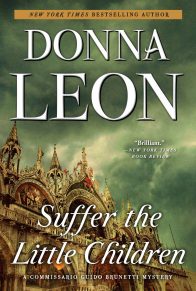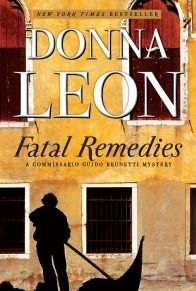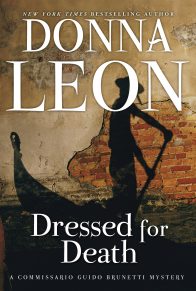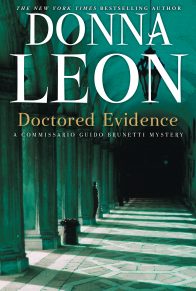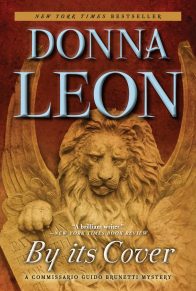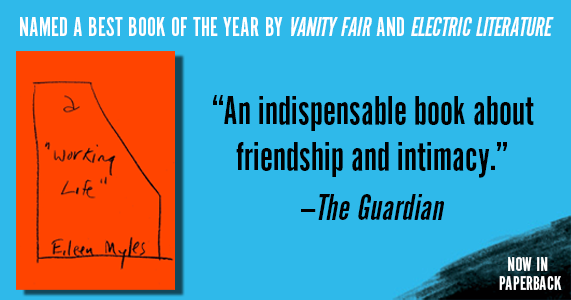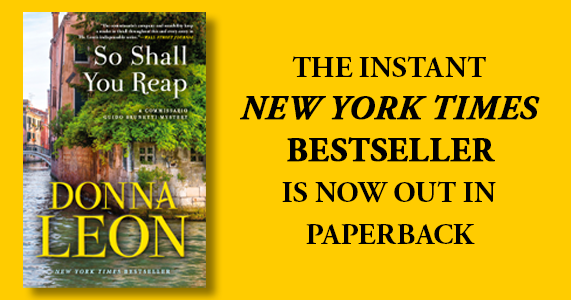Brunetti stood at his window and flirted with springtime. It was there, just on the other side of the canal, evident in the shoots he saw popping up from the earth. Over the last few days, someone – in all these years, he had never seen a person working in the garden – had raked the earth, though he noticed it only now. Tiny white flowers were visible amidst the grass, and those fearless little ones that hugged themselves close to the ground, the names of which he could never remember – the little yellow and pink ones – sprouted from the freshly turned earth.
He opened the windows and felt fresh air flood into his overheated room. It brought with it the scent of new growth or rising sap or whatever it was that led to spring fever and an atavistic urge towards happiness. Birds, he noticed, were busy on the ground, no doubt pleased to discover that the worms had somehow been lured to the surface. Two of them squabbled over something, then one flew away, and Brunetti watched it disappear to the left of the church.
“Excuse me,” he heard someone say behind him. He wiped away his smile before he turned. It was Vianello, wearing his uniform and looking far more serious than he should on such a lovely day. From the expression on the Inspector’s face and the stiffness of his body, Brunetti wondered if he should address him with the formal Lei, a grammatical formality they had abandoned on Vianello’s promotion to inspector. “Yes, what is it?” Brunetti asked in a friendly tone while evading the grammatical issue.
“I wondered if you had a moment,” Vianello said, using the familiar tu and not referring to Brunetti as ‘sir”, thus increasing the likelihood that this would be an informal conversation.
Further to relax the atmosphere, Brunetti said, “I was just looking at those flowers across the way –” gesturing with his head towards the garden –” and wondering what we were doing inside on a day like this.”
“First day you begin to feel it’s spring,” Vianello agreed, smiling at last. “I always used to play hooky.”
“Me, too,” said Brunetti, who had not. “What did you do?”
Vianello sat in the chair on the right, his usual chair, and said, ‘my older brother delivered fruit to Rialto, so that’s where I’d go. Instead of going to school, that is. I’d go over to the market and meet him and help him carry crates of fruit and vegetables all morning, and then go home for lunch at the same time I usually got home from school.” He smiled again and then he laughed. “My mother always knew. I don’t know how she did, but she always asked me how things were at Rialto and why I hadn’t brought her any artichokes.” Vianello shook his head at the memory. “And now Nadia is the same with the kids: it’s like she can read their minds and always knows when they haven’t gone to school or have done something they shouldn’t.” He looked at Brunetti. “You have any idea how they do it?”
“Who? Mothers?”
“Yes.”
“You said, it, Lorenzo. They read minds.”
Brunetti judged that the atmosphere was sufficiently relaxed and so asked, “What was it you wanted?”
His question restored all of Vianello’s nervousness. He uncrossed his legs and brought his feet together, sitting up straighter. “It’s about a friend of mine,” he said. “He’s in trouble.”
“What kind of trouble?”
“With us.”
“The police?”
Vianello nodded.
“Here? In Venice?”
Vianello shook his head and said, “No. In Mestre. That is, in Mogliano, but they were taken to Mestre.”
“Who?”
“The people who were arrested.”
“Which people?”
“The ones outside the factory.”
“The paint factory?” Brunetti asked, recalling an article he had seen in that morning’s paper.
“Yes.”
The Gazzettino had devoted the front page of its second section to a report of the arrest of six people during a “No Global” protest in front of a paint factory in Mogliano Veneto the previous day. The factory had been repeatedly fined for its failure to observe regulations on the disposal of toxic waste but had continued to operate regardless, choosing to pay the derisory fines rather than invest in changes to its production methods. The protesters were demanding that the factory be closed and had tried to prevent the workers from entering. This had led to a confrontation between the protesters and the workers, during which the police had intervened and arrested seven people.
“Is he a worker or a “No Global”?” Brunetti asked.
“Neither,” Vianello answered, then qualified his response by adding, “Well, not a real “No Global,” that is. Any more than I am.” This sounded, apparently even to Vianello himself, like a dead end as an explanation, so he took a breath and began again. “Marco and I were at school together, but then he went to university and became an engineer. He’s always been interested in ecology: that’s how we know one another, from meetings and things. Once in a while we have a drink together, after a meeting.”
Brunetti chose not to inquire about these meetings. The Inspector continued. “He’s very concerned about what’s going on at that factory. And in Marghera. I know he’s been at the protests there, too, but he’s never been involved in anything like this.”
“Like what?”
“When things get violent.”
“I didn’t know that was the case,” Brunetti said. The paper had reported only that people had been arrested; there had been no mention of violence. “What happened?” he asked. “Who started it?” He knew how people always answered this question, whether for themselves or for their friends: it was always the other guy.
Vianello sat back in his chair and crossed his legs again. “I don’t know. I only spoke to his wife. That is, she called me this morning and asked me if I could think of some way to help him.”
“Only this morning?” Brunetti asked.
Vianello nodded. ‘she said he called her last night, from the jail in Mestre, and he asked her to call me, but not until the morning. She got hold of me just as I was leaving for work.” Vianello returned to Brunetti’s question. ‘so I don’t know who started it. It could have been the workers, or it could have been some of the “No Globals’.”
Brunetti was surprised to hear Vianello admit this as a possibility. The Inspector went on, ‘marco’s a peaceful guy: he wouldn’t start anything. I know that, but some of the people who go to these things, well, I think they use it as a way to have some fun.”
“That’s a strange choice of word: “fun”.”
Vianello raised a hand and let it fall to his lap. “I know it is, but that’s the way some of these people look at it. Marco’s talked about them, says he doesn’t like them and doesn’t like it when they join a protest, because it increases the risk of trouble.”
“Does he know who the violent ones are?” Brunetti asked.
“He’s never said, only that they make him nervous.”
Brunetti decided to bring the conversation back to its original purpose. “But what did you want to ask me?”
“You know the people in Mestre. Better than I do. And the magistrates, though I don’t know who this has been given to. So I wondered if you could call and see what you could find out.”
“I still don’t understand why you don’t do it,” Brunetti said, making this sound like what it was – a request for information – and not what it was not, a suggestion that Vianello take care of it himself.
“I think it would be better if the inquiry came from a commissario.”
Brunetti considered this for a moment and then said, “Yes; maybe. Do you know what the charge is?” he asked.
“No. Probably causing a disturbance or resisting a public official in pursuit of his duties. Marco’s wife didn’t say. I told her not to do anything until I had time to talk to you. I figured you, or we, might be able to do something . . . well, informally. It would save him a lot of trouble.”
“Did she tell you anything at all about what happened?”
“Just what Marco told her: that he was standing there with a placard, along with the other people from his group: about a dozen of them. Suddenly there were three or four men they didn’t know, shouting at the workers and spitting at them, and then someone threw a rock.” Before Brunetti could ask, Vianello said, “No, he didn’t know who did it; he said he didn’t see anything. Someone else told him about the rock. And then the police were there, and he got thrown to the ground and then they put him in a truck and took him to Mestre.”
None of this surprised Brunetti in any way. Unless someone had been there with a video camera, they would never know who had thrown the first punch, or rock, so it really was anyone’s guess what the charges would be and whom they would be brought against.
After a brief pause, Brunetti said, “You’re right, but we better do this in person.” If nothing else, Brunetti caught himself thinking, it would be an excuse to get out of his office. “You ready to go?”
“Yes,” said Vianello, getting to his feet.





